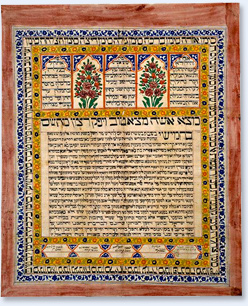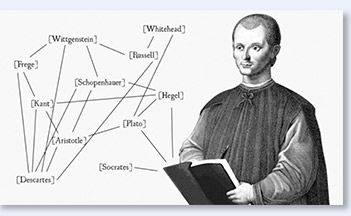While the Digital Humanities community of information scientists, developers and scholarly enthusiasts is making huge progress in the development of tools and virtual research environments (VREs), the vast majority of scholars in the field of Jewish studies rely on traditional methods of research. At the same time digitised primary resources for Jewish studies resources are growing exponentially worldwide.
Jewish Studies were one of the first academic communities to make use of digital resources with the Responsa project which began in 1967.Butis it possible that the present advances in Digital Humanities and many researchers in Jewish studies are like ships in the night that are going to pass by, and probably not meet again?

[1867 November 14], Ket 270
The Judaica Europeana project and network of libraries, museums and archives which hold digital collections has uploaded millions of digital objects to Europeana. This process continues in the framework of the DM2E and AthenaPlus projects. Led by the European Association for Jewish Culture, the partners in the network will in the coming months integrate in Europeana some of the most valuable resources for Jewish studies: the metadata of the collections from the Center for Jewish History in New York (the YIVO and the Leo Baeck Institutes), the JDC Archives, the Jewish Theological Seminary Library, the Jewish Museum in Prague and many others. The latest Judaica Europeana newsletter presents the highlights of some of these collections.
But will anything be done to ensure that these magnificent collections – digitized at great expense with public or charitable funding ― are used to their full potential? Will the opportunities of the Linked Open Data web and the growing box of open-source tools find many takers in the Jewish Studies community? As they used to say: you can lead a horse to the water, but you can’t make it drink….
Dov Winer, Judaica Europeana’s Scientific Manager, has been arguing for some time that Digital Humanities and LOD have the potential to revolutionize Jewish Studies. The time is ripe: the DM2E project and its experts have been working on modelling the scholarly domain and developing award-winning research tools that respond to the needs of scholars. The DM2E project also provides a platform for the integration of Jewish-content metadata in Europeana.

So what’s next?
DM2E and Judaica Europeana are currently involved in converting vocabularies and encyclopaedias into formats which make them available as Linked Open Data and therefore capable of enriching the metadata of Jewish content and provide contextual meanings. This initiative, which is driven by Dov Winer of EAJC and Kay Eckert of the Research Group on Data and Web Science at Mannheim University, will soon result in the publication of The YIVO Encyclopaedia of Jews in Eastern Europe in a LOD format. The PUNDIT and ASK tools, winners of the 2013 LODLAM Challenge, are freely available with tutorials in four languages, on the DM2E website. The newsletters of Judaica Europeana, disseminated widely to the Jewish studies scholars, have been promoting the Digital Humanities agenda and these new tools to their potential constituencies and users. The work of Judaica Europeana and DM2E will be brought to the attention of participants in the forthcoming Xth Congress of the European Association for Jewish Studies in Paris: on 21 July, our partners will present captivating research in a panel entitled New perspectives on Jewish and non-Jewish relations in modern European culture based on Judaica Europeana digital collections.
Dov Winer, in his paper ‘Feeding Digital Humanities’ argues that what is needed to take all these efforts further is an ongoing virtual infrastructure and a community of practice: a network of scholars committed to using a Virtual Research Environment for their research including a small part-time team to lead it. So far 16 academic researchers from various European universities expressed a strong interest.
Lena Stanley-Clamp
Coordinator, Judaica Europeana
Director, European Association for Jewish Culture

Comments are closed.